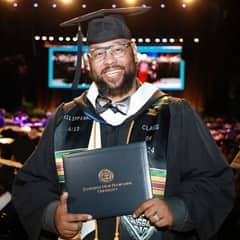What is General Education? Its Purpose and Impact Explained

Discover the purpose and impact of general education courses and how they can reshape your learning outlook and teach essential skills.
So, What Are General Education Courses?

The general education curriculum focuses on the interdisciplinary lens, including courses in history, natural and social sciences, technology and humanities.
Dr. Priscilla Hobbs, a cultural mythologist and interdisciplinary scholar with focus on American popular culture, has authored and edited numerous works in her field. Now serving as a senior associate dean of general education, first-year experience and special programs at Southern New Hampshire University (SNHU), Hobbs described general education as a well-rounded learning experience to help develop a well-rounded student.
Thinking about general education courses as "extra" is a common misnomer, according to Hobbs. Their connection to your career goals may not be as obvious as the courses within your field of study, but they're still relevant. "They are the courses that are actually addressing many of the skills that employers value, especially in regards to interpersonal connections and diversity," Hobbs said.
Anthony Siciliano, a first-generation college graduate and the associate vice president of general education, first-year experience, education and special programs at SNHU, transitioned from a career as a professional photographer and digital artist to higher education. He said that general education credits make up “the largest allocation of credits” across undergraduate degree programs.
“The general education curriculum is a standard, required part of every bachelor degree program in the country and is meant to foster greater accessibility, a clear and relevant academic pathway for students to attain their degree credential and to provide students with the necessary core skills in order to be successful in their lives and chosen career paths,” he said.
What's Another Name for General Education Courses?
Widely, you may hear general education courses abbreviated to "gen eds." But just as colleges differ in their gen ed requirements, they may also have different names for their general education curriculum.
At SNHU, for instance, general education courses are known as "The Commons." This is because the courses involved are applicable to all undergraduate students, regardless of major. They are an opportunity to grow skills, knowledge and perspectives that are relevant to all members of society.
Meanwhile, each individual navigating their general education courses can get something different from the experience. "They have the opportunity to choose their own topics and lean into content in a way that they find beneficial to their own growth," Hobbs said.
What Are the Main Components of General Education?
Although specific general education requirements can differ depending on your college and your program, you'll need to demonstrate competency in several fields of study to earn a bachelor's degree.
You'll likely be required to take general education courses in some of these areas:
- English composition
- History
- Humanities and social sciences
- Mathematics
- Natural sciences

Dr. Christopher Healow, an associate professor of philosophy with over a decade of higher education teaching experience, is also the university campus director of The Commons at SNHU. He likened general education courses to "choose your own adventure," as there are often a variety of options within the general education categories that you can choose from based on your interests, goals and schedule.
You might need to take multiple courses in these broader categories to fulfill your program's requirements. Certain schools also have requirements that other schools don't. For example, some schools require foreign language coursework.
To learn more about your options and program requirements, Healow recommended speaking with an academic advisor.
What's the Purpose of General Education?

You might be wondering what the true purpose of general education is in the academic setting as you prepare to join the workforce, advance in your job or change careers.
While they can help you gain important professional skills, the answer goes beyond work. It connects to a foundation of education: "Our general education follows the model of a traditional liberal education, which assumes that education is fundamentally about helping students to prosper in their lives, both professionally and personally," Healow said.
Together, the courses form a holistic approach to learning and developing. "General education is there so you can enjoy different perspectives on your life as a human being, not solely as a participant in our economy," Healow said.
What Are the Benefits of Taking General Education Courses?
Here are four ways general education courses can help you succeed.
 Reshape Your Outlook on Learning
Reshape Your Outlook on Learning
General education courses provide a wide breadth of learning opportunities and skills that can be applied to everyday life. Siciliano said the general education curriculum is meant to provide a foundation that promotes successful behaviors that lead to lifelong learning.
“For students to be adequately prepared to do well in their chosen career, they need to have not only the rigor of an academic education but also an applied, relevant and practical curriculum that focuses on the development of these core skills,” Siciliano said.
General education can also offer a deeper understanding and appreciation of humankind, according to Healow. "Students will be better served if they have an opportunity to learn about history, about philosophy, about art and literature, about science and mathematics, regardless of their chosen majors," he said. "Because these disciplines invite you to use your mind in different ways and constitute a legacy of human achievements that belongs to all of us."
 Learn Soft Skills Desired by Employers
Learn Soft Skills Desired by Employers
To impress employers and prove yourself as a member of a team, it’s important you learn interpersonal skills. These include things such as empathy, conflict resolution and being able to communicate effectively.
Siciliano said the general education courses “encourage an aptitude for empathy infused with objectivity and curiosity” and “develop a strong sense of self in one’s capabilities and the ability to reflect and learn from one’s experiences” — skills employers seek in the people they hire.
“These soft skills, or core skills, are the knowledge, dispositions and abilities needed by students to be successful in their chosen professions and for becoming an immediate contributor to a rapidly changing global workforce,” Siciliano said.
Hiring employees with these attributes is essential to keep a company running smoothly. “Numerous self-help books and professional development opportunities are designed to help employees develop their soft skills,” Hobbs said. “Each day, our paths cross with people from diverse backgrounds and perspectives, and we need to be able to manage those interactions in a positive way rather than in a way that promotes conflict."
 Be Well-versed in a Wide Variety of Disciplines
Be Well-versed in a Wide Variety of Disciplines
Introducing this broad range of perspectives creates the ability to look at problems from different angles and help present possible solutions.
“We may look at an issue historically, or we may put on the hat of social scientists,” Hobbs said. “Being able to see through these lenses helps us critically navigate through all the information that surrounds us at any given second. It helps us make decisions about what to filter, what we find interesting and what we need to do about anything. Without that, the world and all the information passing through it can quickly seem overwhelming.”
Siciliano said the interdisciplinary general education courses provide students with different perspectives from which to view the world, giving them the ability to:
- Analyze information for accuracy
- Communicate effectively with different audiences
- Display literacy in digital technology
- Tackle a variety of real-world problems
Some schools use their general education curriculum to consider the impact of cultural events on students, according to Hobbs. "These courses help students understand and process through their experiences," she said.
 Learn With People From Diverse Disciplines
Learn With People From Diverse Disciplines
Because general education courses are shared across undergraduate programs, it's likely you'll find yourself taking classes with and learning from people outside of your main discipline.
"These courses tend to be filled by a very diverse set of students, who have very different backgrounds, perspectives and aspirations," Healow said. "Providing such students with an occasion to come together and share educational experiences with those outside their programs tends to be enriching and rewarding for everyone involved."
These interactions and interchange of ideas can lead to an exciting and perhaps transformative college experience, according to Hobbs.
It's possible you'll also develop personal and professional relationships with people that you otherwise may not have met. Healow met his wife in a choir class, which he took to meet a general education requirement.
Find Your Program
What is a General Education Degree Called?
While general education typically refers to the common curriculum that undergraduate students complete, it's also a type of degree. A general education degree is usually called a bachelor’s in general studies. This Bachelor of Arts (BA) degree can provide you with a strong educational background across many fields.
Siciliano said a general studies degree “provides greater flexibility (for students) to complete their degree according to their work, career and family life.” Whether you’re transferring universities or looking to earn a degree that reflects your broad range of skills, a bachelor’s in general studies can prepare you for the next step in your career.
You can often choose an area of focus within your general studies degree. For instance, SNHU's general studies bachelor's degree offers several potential concentrations, including:
- Business administration
- Coding basics
- Communication
- Criminal justice
- Entrepreneurship
- Psychology

Robert Heckinger '23, a Vietnam war veteran and former business owner, took advantage of the breadth of concentrations available when he earned his general studies bachelor's with a concentration in understanding the past.
"I started off actually with what I want to do, which is the history, and eventually teaching," Heckinger said. "I feel like I've done two journeys in business successfully, and now I want that third opportunity that is to possibly give a gift to some other people in a classroom with some of the knowledge that I've obtained."
Whether or not you choose a concentration, this bachelor's degree can well prepare you for a wide range of careers. It can also ready you for further education if you are pursuing a career that typically requires a master's degree.
If you're interested, you can learn more about what a general studies degree is.

Transferring to a General Studies Program
The BA in General Studies program can help students who are continuing their education apply prior coursework or work experiences toward a degree.
“This can include placement tests, previous classes and military credit,” Hobbs said. “Essentially, the general studies degree is designed to help students achieve their goal of a degree without having to start over because they transferred universities.”

Anson Owen '24 transferred credits many times before obtaining his bachelor's degree in general studies with a concentration in criminal justice from SNHU. He said he faced hardships such as homelessness and losing his brother, which prevented him from initially finishing his degree.
"I was still starting over everywhere I went," Owen said. When he found SNHU, an admission team member helped him weigh the options he had with his transfer credits.
"She said, 'Well, that may take you two years, but if you move into this program, it would only take you a year, you'd be able to complete your degree and you'd still have a degree in what you're looking for,'" Owen said.
Some schools offer free transfer credit evaluations so prospective students can find out how many of their existing credits will be accepted. If you want to know how many courses you have left to finish your degree in general studies, it's as simple as this at SNHU:
- Complete the free 5-minute online application. There’s no obligation after filling it out.
- Get your transcripts requested — for free. Chat with an admission counselor, and we'll request your transcripts on your behalf.
- Receive your free evaluation. Soon after all your transcripts are in, you'll get your official evaluation. It will show you what was transferred in – and what classes you need to complete.
You might be surprised to learn how close you are to graduation. Hobbs said most general studies students that have transferred to SNHU are within 15 classes of completing their degree.
A degree can change your life. Choose your program from 200+ SNHU degrees that can take you where you want to go.
Ash Wallis '16 is a published poetry, short fiction, and nonfiction writer in Colorado. She earned her Bachelor of Arts in English Language and Literature through Southern New Hampshire University and a graduate certificate in publishing through Denver Publishing Institute at the University of Denver.
Wallis is a participant in and is building out writing workshops for veterans to utilize writing as a tool for healing and personal growth. She is also an advocate for veterans, speaking to members of Congress as a storyteller with the Military Reform Coalition. Connect with her on LinkedIn.
Explore more content like this article

Misinformation vs. Disinformation in the Age of AI

What Are Extracurricular Activities and Why Are They Important?

Dual Degree vs. Double Major: What’s the Difference?
About Southern New Hampshire University

SNHU is a nonprofit, accredited university with a mission to make high-quality education more accessible and affordable for everyone.
Founded in 1932, and online since 1995, we’ve helped countless students reach their goals with flexible, career-focused programs. Our 300-acre campus in Manchester, NH is home to over 3,000 students, and we serve over 135,000 students online. Visit our about SNHU page to learn more about our mission, accreditations, leadership team, national recognitions and awards.

